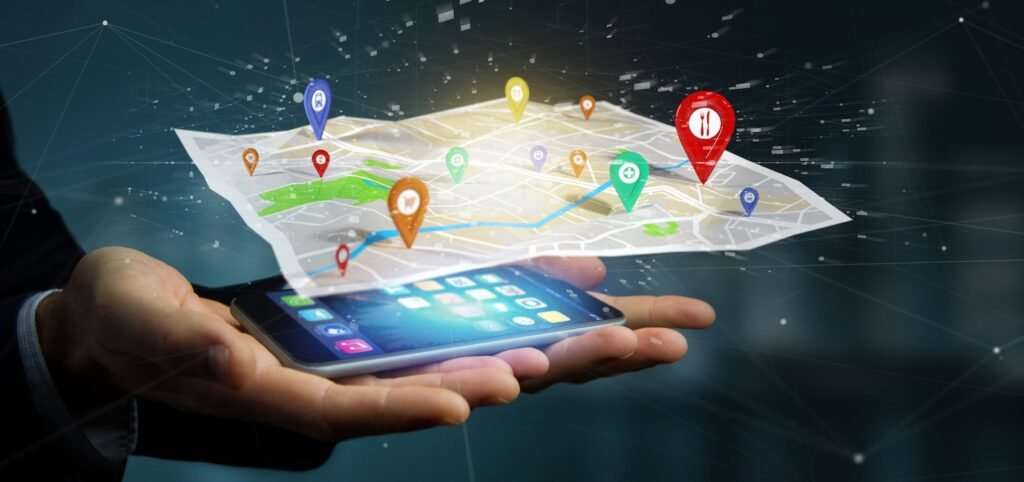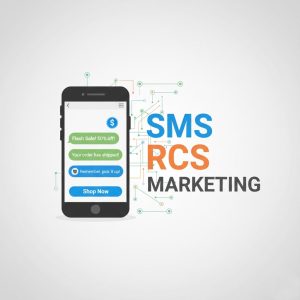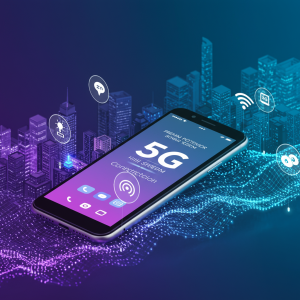Location-Based Marketing Drives Revenue Growth and Customer Loyalty

The Power of Proximity in Modern Marketing
In today’s hyper -coupled world, consumers are moving forward, smartphones in hand. This dynamic has created a unique opportunity for companies to contact potential customers at the right time – when they are physical near your business and are important for making decisions about purchases. The site -based marketing benefits from geographical location technology, which creates a timely, relevant and personal experience to convey to consumers based on its current location.
According to recent data, 88% of consumers who discover a local business on the smart telephone or call it within 24 hours. This striking figure emphasizes the enormous potential of site -based marketing strategies to convert digital commitment to specific business results. As mobile technology develops, sophistication and efficiency of site -based marketing have increased rapidly, making it an important component of any comprehensive marketing strategy.
At MobileDominate.com, we’ve witnessed firsthand how businesses that effectively implement location-based marketing consistently outperform competitors who rely solely on traditional marketing methods. This blog post explores the significant benefits that location-based marketing offers to businesses of all sizes and across various industries.
What Exactly Is Location-Based Marketing?
Before diving into the benefits, let’s establish a clear understanding of location-based marketing. At its core, location-based marketing is a strategy that uses a consumer’s physical location to deliver relevant and timely marketing messages. This can be accomplished through various technologies and techniques:
- Geofencing: Creating virtual boundaries around specific locations that trigger notifications when consumers enter or exit these areas
- Geotargeting: Delivering content based on a user’s general location (city, zip code, etc.)
- Proximity marketing: Using technologies like Bluetooth beacons to communicate with smartphones in extremely close proximity
- GPS targeting: Utilizing GPS coordinates to deliver highly precise location-based content
- Location-based social media: Leveraging location check-ins and location-tagged content on platforms like Instagram, Facebook, and Snapchat
According to Search Engine Journal, local search optimization complements these techniques by ensuring businesses appear prominently when consumers search for products or services in their vicinity.
7 Transformative Benefits of Location-Based Marketing for Business Growth
1. Dramatically Increased Foot Traffic and In-Store Visits
The most immediate and average gain from site -based marketing is the opportunity to run physical trips at your business site. By targeting consumers who are already in your surrounding area, you can increase the possibility of converting digital commitment dramatically.
Facts research indicates that site-based ads have doubled on road stores compared to non-site-based ads. The reason for this is that site-based publicity consumers create a sense of immediate and convenience key factors in decisions.
For example, a coffee shop can send a special discount offer to consumers within half a kilometer during the afternoon hours. This time, site -packed messages can effectively redirect the nearby consumers who can pass without stopping anything else.The most immediate and average gain from site -based marketing is the opportunity to run physical trips at your business site. By targeting consumers who are already in your surrounding area, you can increase the possibility of converting digital commitment dramatically.
Facts research indicates that site-based ads have doubled on road stores compared to non-site-based ads. The reason for this is that site-based publicity consumers create a sense of immediate and convenience key factors in decisions.
For example, a coffee shop can send a special discount offer to consumers within half a kilometer during the afternoon hours. This time, site -packed messages can effectively redirect the nearby consumers who can pass without stopping anything else.The most immediate and average gain in place -based marketing is the ability to run physical trips at your business site. By targeting consumers who are already in your surrounding area, you can increase the possibility of converting digital commitment dramatically.
Facts research indicates that site-based ads have doubled on road stores compared to non-site-based ads. The reason for this is that site-based publicity consumers create a sense of immediate and convenience key factors in decisions.
For example, a coffee shop can send a special discount offer to consumers within half a kilometer during the afternoon hours. This time, site -packed messages can effectively redirect the nearby consumers who can pass without stopping anything else.
2. Enhanced Customer Experience Through Contextual Relevance
Modern consumers expect personal experiences from brands. Place -based marketing takes personalization to the next level, where customers are physical customers, by adding relevant relevance on the basis of this. This relevant consciousness allows companies to distribute messages that are not only individual that is the customer, but also what they do or what they do in the particular moment.
A hardware store can send information about ice spades and ice melts to customers in their area just before a forecast -snow. This shows an understanding of the customer’s immediate requirements depending on both location and time, leading to a more useful and low infiltration marketing experience.
According to HubSpot, 72% of consumers say they only engage with personalized marketing messages. When that personalization includes location context, engagement rates increase even further.
3. Improved Marketing ROI Through Precise Targeting
Traditional mass-marketing approaches inevitably waste resources by reaching many consumers who have no interest or immediate need for the advertised products or services. Location-based marketing dramatically improves marketing efficiency by targeting only those consumers who are:
- Physically near your business
- Demonstrating intent through their location choices
- More likely to convert based on proximity
This precision targeting leads to significantly higher conversion rates and return on investment. According to Mobile Marketing Association, location-targeted mobile ad spending delivers twice the ROI of non-location-targeted campaigns.
The financial implications are substantial: businesses can accomplish more with smaller marketing budgets by focusing resources on the highest-potential customers—those already in or near their service area.
4. Real-Time Competitive Advantage
The site -based marketing gives companies the opportunity to disturb consumers who can visit or evaluate competitors. This creates unique opportunities to influence the purchase decisions in important moments.
A car dealer, for example, can install Geofens around the competing dealer and send special incentives to consumers entering these areas. This time intervention can effectively redirect consumers to move to your place.
As discussed on our comprehensive guide at MobileDominate.com, this ability to influence consumer behavior in real-time represents a powerful competitive advantage that traditional marketing approaches simply cannot match.
5. Enhanced Data Collection and Customer Insights
Beyond its immediate marketing benefits, location-based marketing generates valuable data about customer movement patterns, visit frequency, dwell time, and cross-shopping behaviors. These insights can inform various business decisions beyond marketing:
- Store layout optimization: Understanding how customers move through physical spaces
- Business hours adjustment: Aligning operating hours with peak customer traffic times
- Staff scheduling: Ensuring appropriate staffing levels during high-traffic periods
- Product placement: Optimizing merchandise positioning based on customer movement patterns
According to research by the Location Based Marketing Association, 75% of companies that implement location-based marketing report better insights into customer behaviors and preferences. These insights create a virtuous cycle where better understanding leads to more effective marketing, which generates even more useful data.
6. Strengthened Customer Loyalty and Relationship Building
Place -based marketing stands out to identify and promote customer loyalty by identifying and rewarding repeated trips. By accepting the presence of the customer and offering increasing benefits for continuous protection, companies can sometimes make visitors loyal advocates.
A restaurant can automatically identify when a customer travels his fifth and sends a special thank you to a dessert offer. This unexpected recognition creates positive emotional associations and encourages continuous loyalty.
Research suggests that it costs five times more to get a new customer than to maintain an existing one. Place-based loyalty programs utilize this economy by focusing on resources on relationships with Siddha customers.
7. Seamless Integration of Online and Offline Customer Experiences
Modern consumers don’t distinguish between online and offline brand interactions—they expect a coherent experience across all touchpoints. Location-based marketing helps bridge the digital-physical divide by connecting online activities with in-store experiences.
A clothing retailer can remind app users about items in their digital shopping cart when they enter a physical store location. This seamless connection between digital browsing and physical shopping creates convenient, frictionless customer journeys.
According to Harvard Business Review research, customers who engage with brands across multiple channels spend an average of 4% more in-store and 10% more online than single-channel customers. Location-based marketing facilitates this valuable omnichannel engagement.
Implementing Location-Based Marketing Effectively
While the benefits are compelling, successful implementation requires strategic planning and thoughtful execution:
Start with Clear Objectives
Define what success looks like for your location-based marketing efforts. Are you primarily aiming to:
- Increase foot traffic?
- Boost average transaction value?
- Improve customer retention?
- Drive awareness of new products or services?
Your objectives will determine which location-based techniques will be most effective.
Choose the Right Technologies
Different location-based technologies serve different purposes:
- Geofencing works well for casting a wider net around your business or competitors
- Beacons excel at in-store navigation and ultra-precise messaging
- GPS targeting is ideal for reaching consumers on the move
Select technologies that align with your specific business goals and customer behaviors.
Respect Privacy Concerns
Location data is inherently sensitive. Always:
- Be transparent about data collection practices
- Obtain proper consent before tracking location
- Provide clear value in exchange for location sharing
- Follow all relevant privacy regulations (GDPR, CCPA, etc.)
Conclusion: Location-Based Marketing as a Strategic Imperative
In a fast mobile-first world, site-based marketing has developed with an innovative strategy, which has developed for a strategic imperative for companies that want to remain competitive. By giving the right place to the right place and the right customer, site -based marketing creates specific opportunities for effective commitment that runs average business results.
Benefits-sancted gasoline traffic, expanded customer experience, better returns, competitive advantage, valuable data insight, strong loyalty and seamless omnichanel integration-modern marketing to create a location-based marketing in the integration mode marketing arsenal.
Since the consumer’s expectations of relevance and privatization continue to increase, businesses will effectively implement location -based marketing strategies quickly differ from competitors who depend on less targeted approaches. The question is no longer used on site -based marketing, but how to use it most effectively for its specific business context.In a fast mobile-first world, site-based marketing has developed with an innovative strategy, which has developed for a strategic imperative for companies that want to remain competitive. By giving the right place to the right place and the right customer, site -based marketing creates specific opportunities for effective commitment that runs average business results.
Benefits-scanted gasoline traffic, expanded customer experience, better returns, competitive advantage, valuable data insight, strong loyalty and seamless omnichannel integration-modern marketing to create a location-based marketing in the integration mode marketing arsenal.
Since the consumer’s expectations of relevance and privatization continue to increase, businesses will effectively implement location -based marketing strategies quickly differ from competitors who depend on less targeted approaches. The question is no longer used on site -based marketing, but how to use it most effectively for its specific business context.In a fast mobile-first world, site-based marketing has developed with an innovative strategy, which has developed for a strategic imperative for companies that want to remain competitive. By giving the right place to the right place and the right customer, site -based marketing creates specific opportunities for effective commitment that runs average business results.
Benefits-scanted gasoline traffic, expanded customer experience, better returns, competitive advantage, valuable data insight, strong loyalty and seamless omnichannel integration-modern marketing to create a location-based marketing in the integration mode marketing arsenal.
Since the consumer’s expectations of relevance and privatization continue to increase, businesses will effectively implement location -based marketing strategies quickly differ from competitors who depend on less targeted approaches. The question is no longer used on site -based marketing, but how to use it most effectively for its specific business context.
To learn more about implementing effective location-based marketing strategies tailored to your specific business needs, visit our comprehensive resource center at MobileDominate.com today.








